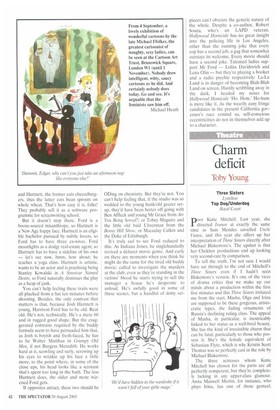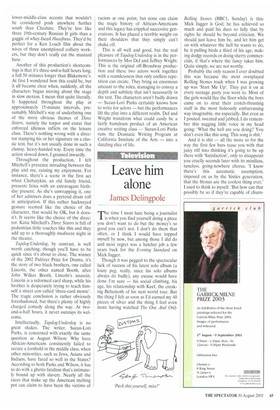Charm deficit
Toby Young
Three Sisters Lyttelton Top Dog/Underdog Royal Court
Door Katie Mitchell. Last year, she I directed Ivanov at exactly the same time as Sam Mendes unveiled Uncle Vanya, and this year she offers up her interpretation of Three Sisters directly after Michael Blakemore's. The upshot is that her Chekhov productions end up looking very second-rate by comparison.
To tell the truth, I'm not sure I would have sat through to the end of Mitchell's Three Sisters even if I hadn't seen Blakemore's version. It's one of the vices of drama critics that we make up our minds about a production within the first five minutes and this Three Sisters irritated me from the start. Masha, Olga and Irina are supposed to be these gorgeous, aristocratic types, the fading ornaments of Russia's declining ruling class. The appeal of Masha, in particular, is inextricably linked to her status as a well-bred beauty. She has the kind of irresistible charm that can be fatal, particularly to those who possess it. She's the female equivalent of Sebastian Flyte, which is why Kristin Scott Thomas was so perfectly cast in the role by Michael Blakemore.
The three actresses whom Katie Mitchell has chosen for the parts are all perfectly competent, but they're completely lacking in any upper-class glamour. Anna Maxwell Martin, for instance, who plays Irina, has one of those genteel,
lower-middle-class accents that wouldn't be considered posh anywhere further south than Cheshire. They're less like three 19th-century Russian It girls than a gaggle of whey-faced Hausfraus. They'd be perfect for a Ken Loach film about the wives of three unemployed colliery workers, but they don't really cut the mustard here.
Another of this production's shortcomings is that it's three-and-a-half hours long, a full 50 minutes longer than Blakemore's. At first I wondered how this could be, but it all became clear when, suddenly, all the characters began moving about the stage in slow motion. I mean that quite literally. It happened throughout the play at approximately 15-minute intervals, presumably Mitchell's way of underlining one of the more obvious themes of Three Sisters, namely the torpor and ennui that enforced idleness inflicts on the leisure class. There's nothing wrong with a director stamping his or her signature on a classic text, but it's not usually done in such a clumsy, heavy-handed way. Every time the action slowed down, I groaned inwardly.
Throughout the production, I felt Mitchell's presence intruding between the play and me, ruining my enjoyment. For instance, there's a scene in the first act when Chebutykin, an old family friend, presents Irina with an extravagant birthday present. As she's unwrapping it, one of her admirers does a pretend drum roll in anticipation. If this rather hackneyed gesture seemed like the choice of the character, that would be OK, but it doesn't. It seems like the choice of the director. Katie Mitchell's Three Sisters is full of pedestrian little touches like this and they add up to a thoroughly mediocre night in the theatre.
Tapdog/Underdog, by contrast, is well worth catching, though you'll have to be quick since it's about to close. The winner of the 2002 Pulitzer Prize for Drama, it's the story of two black brothers, one called Lincoln, the other named Booth, after John Wilkes Booth, Lincoln's assassin. Lincoln is a reformed card sharp, while his brother is desperately trying to teach himself a street con called 'three-card monte'. The tragic conclusion is rather obviously foreshadowed, but there's plenty of highly charged comedy along the way. At twoand-a-half hours, it never outstays its welcome.
Intellectually, TapdoglUnderdog is no great shakes. The writer, Suzan-Lori Parks, is concerned with exactly the same question as August Wilson: Why have African-Americans consistently failed to secure a foothold in the middle class, when other minorities, such as Jews, Asians and Indians, have fared so well in the States? According to both Parks and Wilson, it has to do with a ghetto fatalism that's intimately bound up with slavery. Nearly all the races that make up the American melting pot can claim to have been the victims of
racism at one point, but none can claim the tragic history of African-Americans and this legacy has crippled successive generations. It has placed a terrible weight on their shoulders that they simply can't shake off.
This is all well and good, but the real pleasure of Tapdogl Underdog is in the performances by Mos Def and Jeffrey Wright. This is the original off-Broadway production and these two actors work together with a seamlessness that only endless repetition can create. They bring an enormous amount to the roles, managing to convey a depth and subtlety that isn't necessarily in the text. The characters aren't badly drawn — Suzan-Lori Parks certainly knows how to write for actors — but the performances lift the play into a different realm. Def and Wright transform what could easily be a fairly humdrum product of an American creative writing class — Suzan-Lori Parks runs the Dramatic Writing Program at California Institute of the Arts — into a dazzling slice of life.



























































 Previous page
Previous page